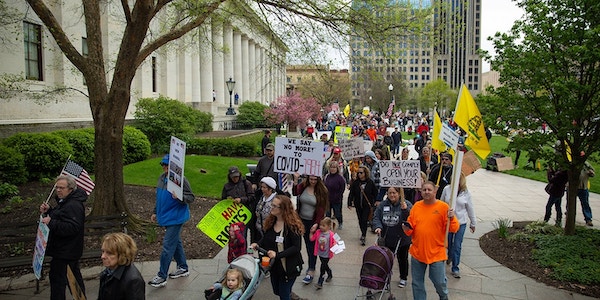AS OHIO BEGINS to ease restrictions and reopen its economy, the state is inviting employers to report employees who don’t show up for work out of concerns about the coronavirus for possible unemployment fraud. This means that workers who stay home because of concerns about unsafe conditions at work may be investigated and potentially stripped of unemployment benefits.
There is now a form on the Ohio Department of Job and Family Services website for employers to confidentially report employees “who quit or refuse work when it is available due to COVID-19,” flagging them for the state’s Office of Unemployment Insurance Operations. The form asks employers for basic contact information; whether their business was deemed essential during the pandemic; for details on whether the employee quit or refused work, including the date and an explanation; and whether they maintain “the safety standards that are required by the Ohio Governor’s Office.”
Under Ohio law, individuals cannot receive unemployment benefits if they can work but refuse job offers or quit their job “without good cause.” Ohioans who are unemployed as a result of the pandemic but don’t qualify for regular unemployment benefits can also register for a new federal unemployment program, Pandemic Unemployment Assistance, that provides unemployment plus a federally funded $600 per week until July 25, the Ohio Department of Job and Family Services announced in late April.
This includes coverage for individuals whose doctors have advised staying home and for those who have child care duties. But, so far, employees aren’t protected if they are afraid of catching the virus at work.
“We first encourage employers to engage in dialogue with an employee who expresses reluctance to return to work about the measures that employers are taking to help employees feel safe,” a spokesperson for the department wrote in an email. Republican Gov. Mike DeWine, who was the first governor in the country to close down schools in response to the pandemic, is gradually reopening the state five weeks after issuing a stay-at-home order. Some Ohioans have already been authorized to return to work, and retailers are scheduled to reopen on May 12.
“Efforts to reopen our economy while stopping the spread of the coronavirus will be successful only if we make workers’ safety our number one priority,” Sen. Sherrod Brown, D-Ohio, told The Intercept in a statement.
There are a lot of reasons a worker may not safely be able to return to work even when the employer calls them back. Any process that overlooks those reasons or emphasizes returning to work over worker wellbeing is a risk to public health.
Kevin Garvey, president of United Food and Commercial Workers Local 75, said it’s “unfortunate” that people are being forced to make a decision between losing their jobs and exposing themselves to the virus, adding that the local union has been able to “create and establish policies and procedures” to protect its 30,000 members.
The pandemic has highlighted the low wages earned by many essential workers, many of whom actually make more money on unemployment. “The vague notice that Ohio employers received on May 1, 2020 does not help workers who are weighing these very heavy decisions,” Sarah Ingles, board president of the Central Ohio Worker Center, said in a statement.
The notice does not define what constitutes a ‘good cause’ exemption, and by doing so, may exclude many Ohio workers who have justifiable reasons for not returning to work and from receiving unemployment insurance benefits.
Ingles went on to note that “while the state did not take the time to define what a ‘good cause’ exemption includes or does not include, it did have time to develop an online form where employers could report employees.” She added that
any policy that affects workers should address the very real and serious concerns they are facing.
As The Intercept has previously reported, some small businesses are concerned that if their employees can receive more money from unemployment, then they won’t be able to rehire them and therefore, qualify for the benefits of the Paycheck Protection Program.
The department also emphasized that its process for determining whether to deny unemployment benefits for a refusal to return to work existed prior to the pandemic. As part of the review process, it said,
Facts will be sought from both the employer and employee and each party has an opportunity to appeal the decision to the Unemployment Compensation Review Commission.

